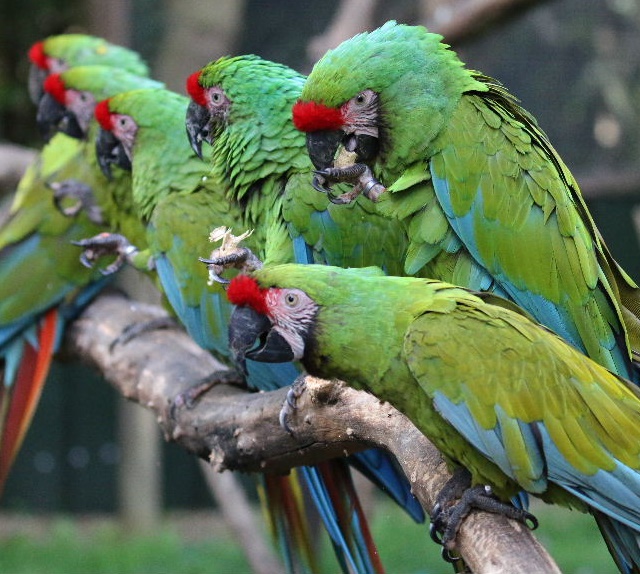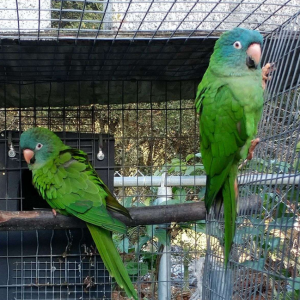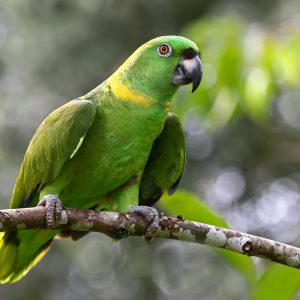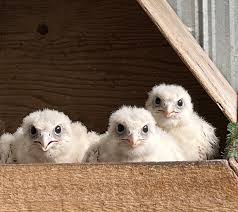Healthy Military Macaw For Sale Online
In the vibrant world of parrots, the Military Macaw (Ara militaris) stands out as a symbol of elegance and intelligence. In this comprehensive guide, we embark on a journey to explore the captivating realm of Macaws, covering everything from their physical characteristics and natural habitat to their diet, care, and the considerations involved in their adoption or purchase.
Characteristics:
The Military Macaw (Ara militaris) is renowned for its striking appearance. With predominantly green plumage, the military macaw stands out due to the vibrant hues of red and blue on its wings and a distinctive patch of bare skin around its eyes. On average, these macaws reach a length of about 27 inches (69 cm), showcasing a moderate size among macaw species.
Natural Habitat:
Native to the forests of Mexico and Central America, Military Macaws inhabit a diverse range of environments, from lowland forests to mountainous regions. Their adaptability allows them to thrive in various habitats, and they are often found in both primary and secondary forests.
Behavior and Temperament:
Known for their sociable nature, Macaws parrots are social birds that form strong bonds with their human caregivers. They exhibit playful behavior, enjoying interactive toys and engaging in vocalizations that include squawks and screeches. Proper socialization and positive reinforcement contribute to a well-behaved and affectionate companion.
Military Macaw Care Guide
Diet:
A balanced and nutritious diet is crucial for the health of Military Macaws. In the wild, their diet includes fruits, nuts, seeds, and vegetation. In captivity, a combination of high-quality pelleted macaw food, fresh fruits, vegetables, and occasional nuts should form the basis of their diet. Providing a variety of foods ensures they receive essential nutrients.
Housing:
The Military Macaw’s enclosure should be spacious, allowing for ample movement and wing-stretching. A sturdy perch, toys for mental stimulation, and a secure environment are essential. Regular cleaning and maintenance of the enclosure contribute to the bird’s well-being.
Socialization and Interaction:
Military Macaws thrive on social interaction. Regular time outside the cage, supervised play, and positive reinforcement contribute to their mental and emotional well-being. They form strong bonds with their human caregivers and appreciate attention and affection.
Health Care:
Regular veterinary check-ups are vital to monitor the overall health of Macaws parrots. Routine examinations help identify potential health issues early on. A proper diet, regular exercise, and maintaining a clean environment contribute to their overall health.
Military Macaw Price
Pricing Factors:
The price of a Military Macaw can vary based on factors such as age, health, and whether it is hand-raised or parent-raised. Hand-raised chicks tend to be more expensive due to the additional care involved in their early development.
Average Cost:
On average, the cost of a Military Macaw can range from $1,000 to $3,000 or more. Prices may vary based on geographic location, the reputation of the breeder, and other considerations.
Adoption Considerations:
Adopting a Military Macaw can be a fulfilling option. Rescue organizations and shelters sometimes have macaws available for adoption. The adoption process often includes an assessment of the potential owner’s ability to provide proper care.
Military Macaw Price: Understanding the Investment
Factors Influencing Price: Several factors contribute to the pricing of Military Macaws. These include their age, health, temperament, and whether they are hand-reared or parent-raised. Additionally, the reputation of the breeder or seller and regional market conditions can influence the price.
Average Price Range: The cost of a Military Macaw can vary widely, ranging from $1,000 to $2,500 or more. Factors such as location, availability, and the bird’s individual characteristics play a role in determining its price.
Lifespan: A Long-Term Commitment
Longevity of Military Macaws: Macaws parrots are known for their impressive lifespan, often living between 40 to 60 years or more when provided with proper care and a suitable environment. Potential owners should be prepared for the long-term commitment involved in caring for these majestic birds.
Dietary Needs: Nourishing the Military Macaw
Balanced Nutrition: To thrive, Macaws Parrots require a balanced and varied diet. Their nutritional needs include a combination of high-quality commercial parrot pellets, fresh fruits, vegetables, nuts, and seeds. Ensuring a diverse and nutritious diet contributes to their overall health and well-being.
Care Requirements: Nurturing Your Feathered Friend
Spacious Enclosures: Macaws Parrots, given their size, require spacious and secure enclosures. A large cage equipped with perches, toys, and stimulating activities is essential for their physical and mental health.
Social Interaction: Known for their sociable nature, Macaws thrive on social interaction. Regular and positive human interaction, along with mental stimulation through toys and activities, is crucial for preventing boredom and fostering a healthy demeanor.
Veterinary Care: Routine veterinary check-ups are essential to monitor the health of Macaws parrots. Regular examinations, vaccinations, and preventive care contribute to their overall well-being.
Military Macaw Eggs
Consideration and expertise. It is crucial to provide a suitable nesting environment, a nutritious diet for breeding pairs, and proper veterinary care throughout the breeding process.
Incubation and Hatching: The incubation period for Military Macaw eggs is approximately 24 to 28 days. Once hatched, the chicks are dependent on their parents for nourishment and care.
Adoption vs. Purchase: Making an Informed Choice
Adoption Benefits: Adopting a Macaws Parrots can be a rewarding experience. Many parrot adoption organizations provide homes for birds in need, offering a second chance for these majestic creatures. Adopting is also often more cost-effective than purchasing from a breeder.
Purchase Considerations: If opting to purchase a Military Macaw from a breeder, thorough research is essential. Reputable breeders prioritize the well-being of their birds, provide health guarantees, and may offer valuable guidance on care and maintenance.
Comparing Military Macaw with Other Macaw Species
Military Macaw vs. Blue and Gold Macaw:
While both species share the characteristic vibrant plumage, the Military Macaw is smaller in size compared to the Blue and Gold Macaw. The Military Macaw also has a distinct facial patch, and its overall coloration differs, with less blue on the wings.
Military Macaw vs. Buffon Macaw:
The Buffon’s Macaw is larger than the Military Macaw, with a more extensive blue patch on its wings. While both species share the striking bare skin patches around their eyes, their sizes and specific colorations set them apart.
Severe Macaw vs. Military Macaw:
The Severe Macaw is another smaller macaw species often compared to the Military Macaw. While both exhibit vibrant green plumage, the Severe Macaw has a more subdued coloration and lacks the distinctive facial patch seen in the Military Macaw.
Conclusion
In conclusion, the Military Macaw stands as a majestic and captivating species, deserving of careful consideration and commitment from prospective owners. Whether contemplating adoption or purchase, understanding their unique needs, social nature, and long lifespan is crucial. Providing a loving and enriched environment ensures the well-being of these regal birds, allowing them to share their vibrancy and intelligence with dedicated caretakers. As stewards of these magnificent creatures, individuals embark on a journey of companionship and mutual enrichment, fostering a bond that can last for decades.
Other Birds
Umbrella Cockatoo
Triton Cockatoo
Sulphur Crested Cockatoo
Buy Moluccan Cockatoo Parrots online
Buy Timneh African Grey Online
Goffin Cockatoo
Blue And Gold Macaw
Buy Congo African Grey Online
Buy Hyacinth Macaw Parrots online




